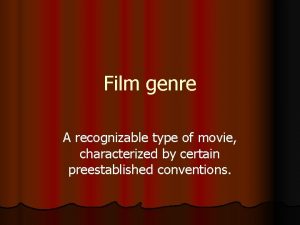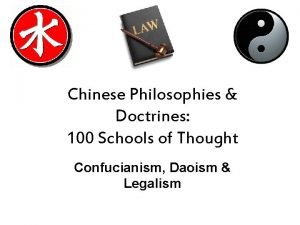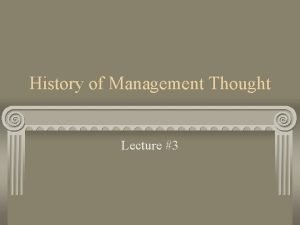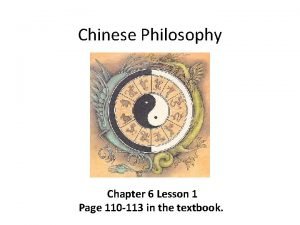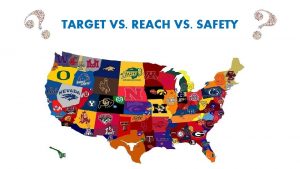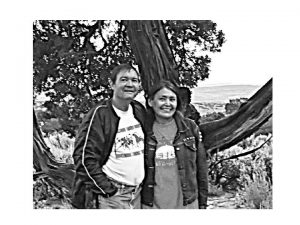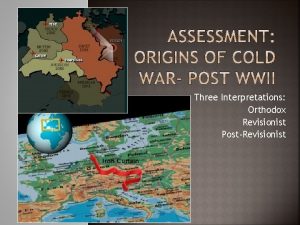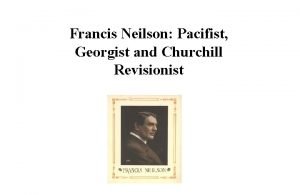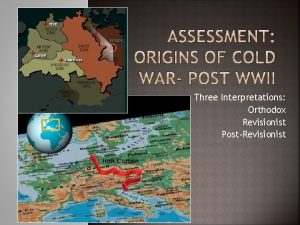The Western Schools of Thought Romanticized vs Revisionist












- Slides: 12

The Western Schools of Thought Romanticized vs. Revisionist Depictions of “The Old West”

“Old School”: The Romanticized Western n This style of western glorifies the heroism of the protagonist, who is often a solitary figure, adept with a gun, although he will not employ it gratuitously. n Any violence perpetrated by him is related to his defence of his land, home, family, town, or other “just cause”. n He has often been grievously and personally wronged, and thus his ruthless attack on his enemies involves “evening the score”, or gaining some justice in an unjust land. n His killings are excused by his purpose, as his motive is “pure”; the audience sympathizes with his cause and roots for the successful achievement of his goals.

“Old School”: The Romanticized Western n He is often hunted by outlaws and finds himself in a “kill or be killed” environment. n Sometimes he is the sole source of protection for a disadvantaged or defenceless group (women, children, or the injured or displaced because of warring factions). n He is often outnumbered and lacking resources, but his savvy, steely demeanour, steadfast determination and extraordinary skill (along with occasional providence or spiritual/divine intervention and simple good luck) win the day. This type of story is commonly referred to as “the revenge plot”.

“Old School”: The Romanticized Western n Example: The Outlaw Josie Wales (1976) n In one of Clint Eastwood’s best western roles, he plays Josie Wales, a peaceful farmer in the days near the end of the Civil War. n After his home is burned and his family murdered by a band of Union marauders, he hardens into a human bullet - dedicated to destroying those who took his "life. " n He joins a band of rebel guerilla fighters who continue to fight the Union - even after the official surrender of the Confederacy - an action which makes them, legally, outlaws. n Despite his unending quest for vengeance, the movie shows us how Josey Wales learns to live again, rededicating himself to the values he was sure he had lost forever.

“Old School”: The Romanticized Western n Shane (1953) a film with a mythical western hero (Alan Ladd) acting like a noble knight in shining leather in its tale of good vs. evil.

“Old School”: The Romanticized Western n True Grit (1969) John Wayne, the quintessential Western hero, as Rooster Cogburn, a boozy marshal engaged in a track-down. Remade in 2010 by the Coen Brothers, with Jeff Bridges in the title role.

“New School”: The Revisionist Western n A “revisionist” western attempts to present an alternative view of the old west-one that doesn’t romanticize the life of the hero, or the “glory and wonder” of frontier life. n The protagonist(s) are often anti-heroes (like the Sisters Brothers!) who are not “white knights”, but rogues or outlaws themselves, trying to survive the anarchy of their environment. n They are sarcastic and mock or disdain conventional society. This modernization of the western focuses on the contradictions, injustice, cruelty and hypocrisy of life in this milieu, and often asks the question who really is “right” or “just”, given the terms of day to day life on the frontier.

“New School”: The Revisionist Western n Law enforcers are often satirized as inept or bumbling, and the society they are charged with protecting lampooned as corrupt, ridiculous, or pathetic. This can be accomplished in a light-hearted way, and comedy often factors into the revisionist saga. n Another feature of this type of western includes the encroachment of modern technology on the old west, and how it is replacing or making obsolete elements of the old way of life (e. g. the train versus the horse). n The effects this has on the people and the culture of this historical period, and the nagging feeling that “time is running out” on the old way of life, is a common thematic motif.

“New School”: The Revisionist Western n Paul Newman and Robert Redford star in the titular roles of this Oscar nominee for Best Picture (and winner for best song, “Raindrops keep falling on my head”). n Butch and Sundance are the two leaders of the Hole-in-the-Wall Gang. n Butch is all ideas, Sundance all action and skill. n When Butch and Sundance rob a train once too often, a special posse begins trailing them no matter where they run. Over rock, through towns, across rivers, the group is always just behind them. n When they finally escape through sheer luck, Butch has another idea, "Let's go to Bolivia", where their inevitable fate is finally sealed.

Western Spoofs & Comedies n Western parodies and comedies that mocked the genre include director Elliot Silverstein's very successful spoof hit Cat Ballou (1965) (with Jane Fonda in the title role, and with Lee Marvin in a dual, Best Actor-winning role), and Mel Brooks' Blazing Saddles (1974). James Garner (of TV's Maverick fame of the late 1950 s) starred in two westernspoofs in the period: director Burt Kennedy's Support Your Local Sheriff! (1969) (that paid homage to previous versions of Wyatt Earp's legendary 'Gunfight at the OK Corral' and My Darling Clementine) and its lesser parody sequel Support Your Local Gunfighter (1971). John Wayne appeared in the western comedy Mc. Lintock! (1963), featuring a battle-of-the-sexes "Taming of the Shrew" relationship between Wayne and Maureen O'Hara, and including a serious, often-mentioned scene of Mc. Lintock breaking up a Native-American lynching.

Western Spoofs & Comedies n City Slickers (1991) followed a group of middle-aged buddies embarking on a two-week western cattle drive led by a tough trail cowpoke named Curly (Jack Palance won a Best Supporting Actor Oscar for the role). A big-screen, commercially-successful comedy-western,

Western Spoofs & Comedies n The Wild West (1999) was a spin-off from the popular mid-60's TV spy show with Men in Black's Will Smith as James T. West and Kevin Kline as Artemus Gordon. Tom Dey's old West spin-off
 Types of film genre
Types of film genre Complete and incomplete thinking
Complete and incomplete thinking Major schools of thought in psychology
Major schools of thought in psychology 100 schools of thought philosophy
100 schools of thought philosophy Salafisim
Salafisim Classical school of thought criminology
Classical school of thought criminology Schools of management thought
Schools of management thought Three schools of thought
Three schools of thought Han feizi quotes
Han feizi quotes What is sociology
What is sociology What is a target school
What is a target school Huntsville.powerschool
Huntsville.powerschool Bổ thể
Bổ thể
